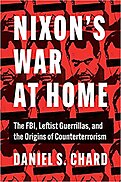Domestic terrorism has been a part of the American political landscape since the rise of the Ku Klux Klan in the Civil War’s aftermath. During the turbulent transformation of American society during the 1960s and 1970s, a new kind of domestic terrorism threat emerged. Homegrown leftist guerrilla groups, such as the Weather Underground and the Black Liberation Army, carried out hundreds of attacks in the United States. The Nixon administration went to previously unseen lengths to hunt down student radicals and other political activists who, while in the minority, engaged in bombings and other violence. Author Daniel Chard argues that the Nixon approach, by creating bureaucratic structures, surveillance, and group infiltration tactics, was the progenitor of the methods used during the post‑9/11 war on terror. Join us for a discussion of Daniel Chard’s new book that explores this history and its continuing relevance today.





